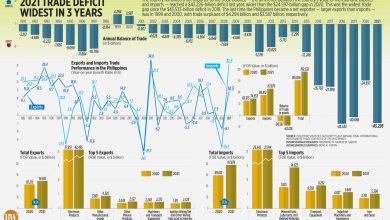Why are investments low and how can the country increase investments to generate jobs and recover from the pandemic?

(Second of two parts)
Given these reasons on why the investment climate is quite poor, what are the solutions? Among these solutions are:
1. Open up the economy. Opening up the economy means removing those restrictions to foreign investment that made the Philippines the third most restrictive in the world. In particular, the Philippines should remove the foreign ownership restrictions in the Constitution. There had been several attempts to amend these restrictive economic provisions in the past but these have failed due to the efforts of the monopolists and duopolies who fear competition.
Even a second-best solution — the passage of the Public Service Act to redefine public utilities in order that only natural monopolies, limited to power and water distribution, sewerage, petroleum distribution, shall be considered public utilities and subject to the 60/40 rule — is facing an uphill battle in the Senate. Under the Public Service Act, telecommunications and transportation will be liberalized. However, the bill is facing a rocky reception in the Senate, where powerful vested interests are trying to prevent liberalization.
The country should also apply for membership in the Comprehensive and Progressive Transpacific Partnership (CPTPP), the regional free trade block being spearheaded by Japan after the United States left during the time of US President Donald Trump, because not only would membership in the CPTPP mean free trade access to huge markets, but it would also force the country to treat foreign and domestic investors equally. Vietnam and Malaysia are already members. China and Taiwan have recently applied. Membership in the CPTPP would mean access to the world’s biggest market, especially if the US, the original proponent of the Trans-pacific Partnership, seeks to rejoin. Factories would seek to relocate in CPTPP member countries because doing so would give them access to a vast market.
2. Amend the Comprehensive Agrarian Reform Law. Our proposal to amend the law to reverse the problem of land fragmentation and low agricultural productivity, has the following features:
a. Increase the land retention limit from five hectares to 24 hectares. Twenty-four hectares is the old limit under the 1935 and 1973 Constitutions for a family farm. The amendment won’t usher in plantation type agriculture, but commercial family farms, which, according to a study by the University of Asia and the Pacific, can only be viable at around this size.
The proposal doesn’t envision plantation type agriculture, but rather more viable, sustainable, and modern family farms with a maximum size of 24 hectares.
Exemption to the 24-hectare limit shall be allowed only on non-irrigated and unproductive lands, subject to Department of Agrarian Reform (DAR) approval. The theory here is that if capital and technology can make those lands productive — as have been proven by Israelis in their arid desert — why not let them do so but give as an incentive, the removal of the land retention limit?
b. Convert all CLOAs (Certificate of Land Ownership Awards) into fee simple titles. All restrictions on the titles, including to whom these may be sold, should be removed and abolished.
c. Allow Agrarian Reform Beneficiaries to rent out their land even if mortgaged. This will help promote land consolidation through leasing.
d. Coverage should be good for one year only. Failure of the DAR to acquire the land within one year shall result in termination of the coverage. Perpetual coverage without acquisition puts the land under uncertainty. Landowners will not invest in their land to improve productivity if they are under threat of coverage and dispossession.
3. Pursue win-win labor market reforms. Our proposal to cure the labor rigidities afflicting the Philippine labor market and hampering manufacturing renaissance and our industrialization, consists of the following:
a. Establishment of Special Employment Zones — These zones can be established in high unemployment areas. The chief features of these Special Employment Zones will be a suspension of the minimum wage and labor security regulations and allow for flexible wage rates, although the usual legal social security protections like social security payments can be kept in place.
In exchange for flexible wage rates, labor organizing rights can be strengthened. This could mean that all workers be members of a union, i.e., a “closed shop” policy. The idea is that workers can share in the increased productivity and profits on a firm level through collective bargaining. This is better than mandated wages on a national level.
b. Pass an Apprenticeship Law. The existing apprenticeship law is defective for the following reasons: first, it’s applicable only for technical industries, and second, it’s only good for six months, not enough time for an employer to train somebody and decide whether to hire him or her.
A strong apprenticeship program underlies Germany’s strength in manufacturing. It produces a skilled workforce that employers need.
c. Amend the Labor Security Provisions in the Labor Code in exchange for Portability of Pensions. The labor security provisions in the Labor Code — a company must make newly hired employees “permanent” after a mere six months is a major deterrent to employment and has given rise to the ENDO phenomenon — the rise of contractual workers whose contract ends at six months, before they can be made permanent. In the Philippines, making an employee permanent makes it very difficult for employers to dismiss an employee even if the employee is unproductive. Furthermore, dismissals are subject to legal appeals that can be brought all the way to the Supreme Court, causing a lot of uncertainty and costs to the employer.
However, in exchange for liberalizing the labor security regulations, the government can offer labor portability of pensions, which is presently absent in the Labor Code. Presently, when a worker resigns or is dismissed from a company, he/she can’t bring his/her seniority to the next employer. He/she is penalized for being mobile since the worker loses the pension benefit the worker accumulates in the employer through years of service.
Therefore, reform is a win-win solution. It would involve give and take from the employee and employer. Furthermore, these reforms will result in increased employment and higher labor productivity.
4. To address the problem of bad governance, the country must enhance competition, dismantle the monopolies by opening the economy, and make the economy more outward-looking. Undervaluing the currency — a strategy employed by export-oriented economies like China, Japan, and Vietnam — could make the economy more outward looking and simultaneously, protect domestic industries.
If the economy is less dominated by monopolies and markets become more contestable without legal barriers to new entrants, foreign or domestic, the environment will change from one where monopolists try to extract rent through political connections and corruption to one where fierce competition forces companies to focus on extracting value by satisfying the customer and innovating.
If the political economy changes to one where the economy is dominated by the exporting class, the government will be forced to be more efficient to support exporters seeking to compete in the global marketplace.
5. Promote solicited PPPs (Public-Private Partnership) for infrastructure and services. The government must pivot back to solicited PPP to provide more public goods and services, especially so since the pandemic has strained the country’s public finances. Private capital must be mobilized to increase infrastructure spending and making the delivery of public services more efficient.
Private capital, unlike the government bureaucracy, is motivated to finish infrastructure projects at cost and on time.
However, PPP projects must be solicited, i.e., subjected to bidding and in accordance with the government plan. Unsolicited PPPs are very prone to corruption and have terms disadvantageous to the government.
6. Strengthen property rights and deregulate. In the case of forestry, where a multitude of claims and rights cause investment uncertainty, the concept of a “bubble” can be applied. This means carving out special forest economic zones, where the government, as the absolute owner of forestlands under the Regalian doctrine, can guarantee the rights of investors. Since the problem of property rights in forestry is so big, accumulated through many years of wrong policies and issuance of many claims and rights, the idea is for government to carve out special areas where rights can be guaranteed. The biggest uncertainty of investors — whether they can reap what they plant — will be removed.
Property rights can also be strengthened by the establishment of a forest cadastre, i.e., a centralized public registry of all claims and rights to the forests. Presently, not even the Department of Environment and Natural Resources (DENR) knows who has claims over what in the forests. A public registry or cadastre, similar to the land cadastre over alienable agricultural lands, can help fix this problem. Rights can then also become bankable because these legal rights are registered, can be confirmed by outside parties, and are enforceable.
To sum up, to attract investment and generate jobs, the country must open up the economy to foreign investments and addresses its binding constraints: land fragmentation, labor rigidities, uncertain property rights and overregulation, dominance of monopolies in strategic industries, bad governance, and lack of public goods.
Only by doing so can the economy generate investments, recover from the pandemic, and achieve sustainable growth.
Calixto V. Chikiamco is a business process outsourcing and internet entrepreneur, a book author, and a writer on political economy. He serves as a property rights consultant to The Asia Foundation and is currently president and co-founder of the Foundation for Economic Freedom. He is a board member of the Institute of Development and Econometric Analysis.




